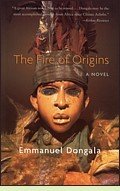|
The Fire of Originsby Emmanuel DongalaReviewed by Margaret Donsbach In the village, the controversy over Mankunku's birth becomes so frenzied that wise old Lukeni must intervene. Later, Lukeni tells Mankunku, a creative, questing spirit who insists on learning for himself instead of blindly following tradition, that he is a destroyer. "It's not an accusation, my child, you are what you are. . . . Perhaps thanks to men like you we'll continue to survive." He has had a dream, he tells Mankunku. "I saw living cadavers, their faces white as the Moon, with a strange hairiness only found in the land of shadows, arrive from under the sea in the bellies of great whales." The destruction the white men wreak is far more shocking and terrible than anything Mankunku has done. Mankunku adapts, survives. After moving to the city, he "no longer saw the foreigners as enemies but as people you could live with. It seemed that the transplant had taken root, that the graft had succeeded." But the story does not come full-circle until an educated young friend shows Mankunku, now very elderly, "the strange products of his laboratory; he prepared solutions with changing, fluctuating colors, he mixed two colorless liquids which reacted to yield a solid with bright colors; he showed him liquid gases, solid gases . . ." A novel of poetic beauty, The Fire of Origins never dodges life's complexity. Through horror, a new world is born, offering a capacity for greater joy than the world that was lost. (original French edition 1987; English edition 2001, 248 pages) The Fire of Origins is on my "Best Historical Novels I Read in 2009" list. More about The Fire of Origins at Powell's Books or Amazon.com
One Hundred Years of Solitude by Gabriel Garcia Marquez, (original Spanish edition 1967; first English edition 1970), about a family in a fictional Colombian village. More info The White Castle by Orhan Pamuk (original Turkish edition 1985; first English edition 1990), about a seventeenth century Italian scholar who becomes the slave of a scholar in Constantinople whom he strongly resembles. More info Knowledge of Angels by Jill Paton Walsh (1994), about a young woman raised by wolves, an atheist prince and an agent of the Inquisition who meet on a fictional Mediterranean island. More info
Precolonial Black Africa by Cheikh Anta Diop (1987). More info Africa: A Biography of the Continent by John Reader (1997). More info Encyclopedia of African History in three volumes by Kevin Shillington (2004). More info
"Disillusion and Hope on the Dark Continent," an essay on the history of European colonialism in Africa by Marshall Burns, 2007 "The Story of Africa" at the BBC website Back to Historical Novels of Africa
|
